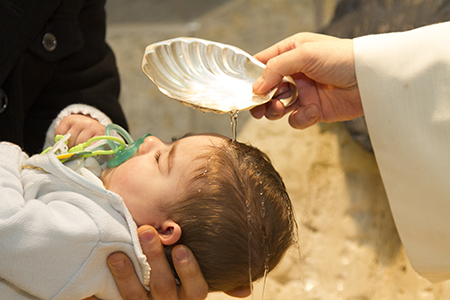World Religion: What is sanctifying grace?
Grace is a word used to indicate many different things and many types of graces, for example real grace, sanctifying grace and sacramental grace. Each of these graces has a different role to play in the life of Christians. Effective grace, for example, is the grace that drives us to act, which gives us the little push we need to do the right thing, while sacramental grace is the grace proper to each sacrament that helps us obtain all the benefits from this sacrament. But what is sanctifying grace?
Sanctifying grace: the life of God in our soul
As always, the Baltimore catechism is a model of concision, but in this case, its definition of sanctifying grace can make us want a little more. After all, shouldn't all grace make the soul "holy and pleasing to God"? How does sanctifying grace differ in this sense from real grace and sacramental grace?
Sanctification means "to make holy". And nothing, of course, is more holy than God himself. Therefore, when we are sanctified, we are made more like God. But sanctification is more than becoming like God; grace is, as the Catechism of the Catholic Church notes (par. 1997), "a participation in the life of God". Or, to go a step further (paragraph 1999):
"The grace of Christ is the free gift that God gives us of his own life, infused by the Holy Spirit into our soul to heal him from sin and sanctify him."
This is why the Catechism of the Catholic Church (also in par. 1999) notes that sanctifying grace has another name: deifying grace, or grace that makes us similar to God. We receive this grace in the sacrament of Baptism; it is the grace that makes us part of the Body of Christ, able to receive the other graces that God offers and to make use of it to live a holy life. The Sacrament of Confirmation perfects Baptism, increasing the sanctifying grace in our soul. (Sometimes sanctifying grace is also called the "grace of justification", as the Catechism of the Catholic Church notes in paragraph 1266; that is, it is grace that makes our soul acceptable to God.)
Can we lose sanctifying grace?
While this "participation in the divine life", as Fr. John Hardon refers to the sanctification of grace in his modern Catholic dictionary, it is a free gift from God, we, having free will, are also free to reject it or give it up. When we engage in sin, we damage the life of God in our soul. And when that sin is serious enough:
"This involves the loss of charity and the deprivation of sanctifying grace" (Catechism of the Catholic Church, par. 1861).
This is why the Church refers to such serious sins as ... that is, sins that deprive us of life.
When we engage in mortal sin with the full consent of our will, we reject the sanctifying grace that we have received in our Baptism and Confirmation. To restore that sanctifying grace and embrace the life of God in our soul again, we must make a full, complete and contrite Confession. In this way it brings us back to the state of grace in which we were after our Baptism.
